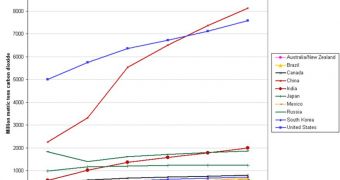With the last meeting of the United Nations on the issues of global warming scheduled to start on December 6 in Copenhagen, policymakers are looking in every possible place for studies to inform them and their decisions. This is a very active time, right before the summit, as demonstrated by the scandal that is currently raging for nothing over leaked e-mails from UK climate agencies. It's no coincidence that they appeared online just a few days before the most important climate summit ever.
The goal of the new meeting is to find a successor for the 1997 Kyoto Protocol, which was the first international agreement on mitigating the effects of pollution and global warming. This is the last year when an accord can be reached. Any later, and it will not go into effect in time to have any discernible effect on climate change, experts warn. Stakes are high, as poor nations continue to demand international funds to help safeguard the world's forests, while larger nations resist, though they are mostly responsible for the current state of affairs.
A new angle that could be taken into consideration at the Copenhagen talks was published in a new scientific paper, by a group of researchers from several countries. The report analyzes carefully the major implications that efforts to safeguard the planet may have on public health, in the short- and long-term. It has been known for a long time that the most drastic measures that can be taken to mitigate the effects of climate change are not necessarily the healthiest ones, which is not to say that they are harmful. And certainly, they are better than living exposed to high concentrations of dangerous chemicals in the atmosphere, healthcare providers say, quoted by Nature News.
The report was already distributed to and read by some of the key players of the new UN summit, including Ban Ki-moon, the UN secretary general, Margaret Chan, the director-general of the World Health Organization (WHO), Kathleen Sebelius, the secretary for the US Department of Health and Human Services, and Andy Burnham, UK secretary of state for health, among others. “Policies for mitigating the impact of climate change must align with policies for protecting public health. [The study] can guide the assessment of alternatives for mitigation and motivate wise choices,” Chan says. The paper was published in the current issue of the journal Lancet, Nature News reports.

 14 DAY TRIAL //
14 DAY TRIAL //